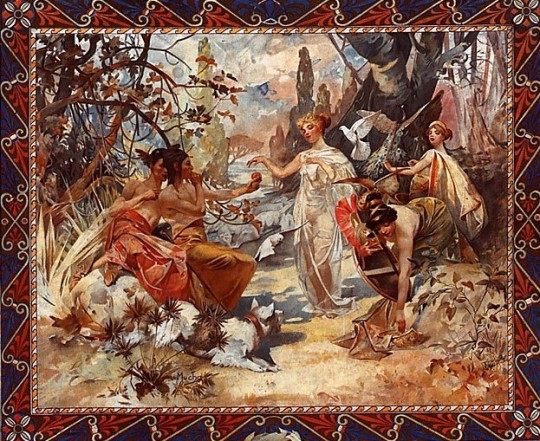#Judgement of Paris
Text

Aphrodite, Athena, and Hera during the Judgement of Paris.
1K notes
·
View notes
Text
Some people are very confused about why, in the myth of the Judgement of Paris, the three goddesses who fall for the Apple of Discord trick are Aphrodite, Hera and Athena. They usually understand why Aphrodite and Hera would fall for the trick of "the most beautiful" - one is the goddess of love, sexuality, romance and beauty ; the other is the queen of the goddesses. But when it comes to Athena, they tend to have a hard time seeing the goddess of wisdom, war, peace, intelligence and virginity get enroled into a "I'm more beautiful than you" petty feud.
... Except it is very much in line with her character, and yes, these three deities are in classical mythology the most vain of the goddesses.
Now, I will here use both Greek and Roman example mixed together because I do not have time to do a thorough split and explanation for everything - so rather let us take an overview of the goddesses' legends as a whole, throughout the centuries.
Aphrodite is vain, this is something that has been established regularly. She is a being of seduction and love, she is the most beautiful of the goddesses since birth and if it wasn't enough she had her husband create a magical belt for her that makes her attractive to anyone who sees her (a husband she cheated on with one of the worst gods of Greek mythology just because said husband was ugly and the other god was hot. Hated but hot.)
One version of Echo's legend has Pan's unrequired love for her caused by Aphrodite as a punishment for not giving her the "most beautiful" award (and turned the other contestant who won into a shark). Aphrodite persecuted Psyche because she was said to be more beautiful than her. Myrrha was cursed by Aphrodite to fall in love with her father because her mother claimed she was more beautiful than the goddess. And there's a lot of other tales like that - so it is well established that not only is Aphrodite the most beautiful goddess, she makes all of her efforts to stay that way and will be VERY angry if anyone refuses her this title (sounds a bit insecure if you ask me but what do I know?)
If we go to Hera, we have again a certain case of pride and a status to be held. Hera is renowned for her beautiful eyes (the famous "cow-eyes" which no, are not an insult, but where an Ancient Greek compliment, because cow-eyes were deemed to be beautiful), and she is the queen of the gods, Zeus' eternal queen, THE first goddess among them all. That's a certain status to hold - and since she is known to have a bad temper, this comes of as a form of vanity and jealousy. The fact Herakles was named Herakles, "the glory of Hera", was precisely in an attempt to appease the goddess' wrath by appealing to her with flattery (turns out it didn't work). Remember: when Zeus had children of his own, without female help, such as Athena (or rather when it looked like he produced Athena on his own), Hera got pissed off because she saw this as a personal offense and tried to have a child of her own without Zeus just to prove him she could do it too (and the result was always disastrous, ranging from Hephaistos to FRIGGIN TYPHON).
This also ties into the whole idea of Hera persecuting Zeus' lovers and "bastards" out of jealousy. Note that she does not persecute ALL of Zeus' lovers, nor does she persecutes all of his extra-marital children... She always picks up those that Zeus seems to favor. That was why it all started with Herakles: Zeus was boasting about how he was going to shower his son with great gifts and a glorious destiny and all that, and Hera wouldn't have that. But she did not persecute Herakles' mother in any way... Just the son that Zeus clearly favoritized. And it becomes VERY obvious Hera's jealousy is not just related to a case of "cheating" in the case of Leto. Hera persecuted Leto for bearing Zeus' children and being deemed more beautiful than her by Zeus... When the myths are clear that Leto was Zeus companion (and possible wife) BEFORE Hera married Zeus. Before this whole story became another one of Zeus' cheating cases, this was a tale of Hera, unmarried to Zeus yet, simply being jealous of Leto being deemed more beautiful than her.
So this was all quite well established... But what about Athena, then, you ask?
Athena is also vain. I am sorry to announce it to you, but all the goddesses of Ancient Greeks have a flaw in myths (not in religion though, in religion all the goddesses are perfect and benevolent, but in legends and texts they are human-like with flaws and vices), and Athena's personal vice is vanity. The whole Arachne myth has sometimes been interpreted as a manifestation of Athena's personal pettiness, as in she cannot stand that someone is better than her at weaving. (It is a bit complicated since as I said before the legend of Arachne is purely Roman not Greek but I also told you I was going to mix Roman and Greek today so you have been warned). Even outside of the legend of Arachne, there is the legend of the flute - how Athena invented the first flute, but then cast it away and cursed it because when she played it, she looked ugly and people mocked her. This is probably the most famous legend about her vanity. And as I posted a long time ago - while this version of Medusa's legend was mostly lost to time because we lack the text, and it was preserved in scholia, we know that by Classical Greece the legend of Athena turning Medusa into a monster was quite popular... but it was all about Medusa being more beautiful than Athena, hence her being turned into a monster.
There's also a legend of a Meropis turned into an owl for mocking Athena's eye-color...
Anyway! Conclusion, it makes sense in the wider scope of Greco-Roman mythology to have these three goddesses be the one to fall for Eris' scheme, because they are the three most vain Olympian goddesses. Now it would have been weird if the candidates would have been, I don't know... Demeter or Hestia. These goddesses are not renowned for any vanity. But Athena? Yeah, makes sense.
EDIT: @teamrocketsfatknockers made a quite important point in a reblog and so I will add a point to my article.
I will insist that all I present to you above is from an "in-universe" point of view and a literal reading of the story. We are here talking of "humanized characterization" for the goddesses, and from a purely narrative, fictional point of view. That was my angle of attack: Why would Athena be considered "vain" in-story when we typically associate an asexual virgin who hates romance and is more into war and high-intellects with someone not much into superficiality or appearances.
But as I repeatedly said before, each myth has at least three levels of interpretation and three meaning warped in one. A religious meaning (though the one in the Judgement of Paris is... unknown to me so far), a literal meaning (as in we have a story, with characters, and this is a fiction) and a metaphorical or philosophical meaning. So I need to highlight that the myth of the Judgement of Paris can be read in a philosophical way as such. Why are these three goddesses searching for the Golden Apple aimed at the "fairest of them all"? Because all three of them embody the most attractive and seductive concepts a Greek man can ever hope for ; they are all three the ideals of Ancient Greek mindset and society. As such Paris' choice and the goddess' quarrels isn't about just satisfying the petty vanity of superficial divas anymore - it becomes a deep debate about which ideal, which dream is the most desirable for a Greek hero, and by extension for a Greek man. Hera is royalty, supremacy, political power and domination ; Athena is peace and wisdom, heroism and cleverness ; Aphrodite is romance, love, beauty and sexuality. And this all reflects within their gifts to Paris - which are in fact extension of what the goddesses themselves embody and represent.
You could sum it up as: Do you want to be a king, a hero or a lover? What would reward you most in life, a crown, a sword or a wife? What allures to you more, power, glory or romance?
Again, that's the beauty of the Greeks myths - and of all myths in the world. They depict simultaneously the gods as the pettiest more vicious selfish and flawed persons you ever met, basically warped caricatures of humanity... and as deep, profound, essential principles of human nature and human society, whose every interaction with mortals causes philosophical debates, ideological questioning and existential crisis.
210 notes
·
View notes
Photo

The Judgement of Paris by Walter Crane (1909)
#walter crane#art#paintings#fine art#1900s#1900s art#pre-raphaelite#pre-raphaelism#painting#english artist#british artist#mythology#greek mythology#paris#judgement of paris#aphrodite#athena#hera#greek goddess#classic art
2K notes
·
View notes
Text
The Judgement of Tumblr
You have yet again been handed a golden apple and tasked with giving it to the fairest of the Goddesses on Mount Olympus.

Featuring the some of the more popular "Secret 4th Options" I remember from the last time.
[Image Source]
#lightning round#judgement of paris#I'm gonna try and start doing some of these again#greek mythology#overly sarcastic productions#overlysarcasticbracket
254 notes
·
View notes
Text

Hermes with the apple of Eris (discord), from the Tales of the Greeks and Trojans, illustrated by Janet and Anne Grahame Johnstone, 1963.
#hermes#mythology#art#symbolism#ancient greece#greek gods#greek mythology#apple#eris#judgement of paris#vintage illustration#caduceus#old books
131 notes
·
View notes
Text

José Bermejo Sobera (Spanish, 1879-1962)
The Judgement of Paris, 1909
Real Academia de Bellas Artes de San Fernando
#blonde brunette redhead trope#art#Jose Bermejo Sobera#José Bermejo Sobera#spanish art#spanish#judgement of paris#the judgement of paris#fine art#european art#classical art#europe#european#fine arts#oil painting#europa#mediterranean#spain#hispanic#latin#classic art#greek mythology#western civilization#southern europe#cradle of civilization#1800s#blonde#brunette#redhead#women
118 notes
·
View notes
Text

on today's edition of "Oracle put way too much effort into a Trojan War shitpost"
any time i think about the Judgement for too long i really get struck by what an unfair situation it was - Paris was always going to earn the ire of twice as many godesses as he earned the favor of, and none of these 3 are good to have as an enemy (not that it's really good to have...any god as an enemy).
#trojan war#judgement of paris#aphrodite#athena#hera#paris of troy#<- not pictured but. you know. relevant.#my art
39 notes
·
View notes
Text
"And this found favor with all other gods, but not with Hera, nor with Poseidon, nor with the gleaming-eyed maiden Athena, for their hatred persisted, as at the start, for sacred Ilion, and the people of Priam, because of the folly of Alexandros who insulted the goddesses, when they came to his shepherd’s steading, and gave the nod to her, the goddess whose gift to him was ruinous lust." (Iliad Book XXIV)
This is widely believed to be a reference to the Judgement of Paris, so does it suggest that Poseidon was, for some reason, also offended that Alexandros chose Aphrodite instead of Hera or Athena? On whose behalf is he angry?
#hera#poseidon#athena#aphrodite#the iliad#greek mythology#paris of troy#alexandros#judgement of paris
32 notes
·
View notes
Text
If, during the Judgement of Paris, he had asked each goddess: "You consider yourself the fairest, but who do you consider the fairest after you?"
What would Hera, Athena, and Aphrodite have said?
12 notes
·
View notes
Text

The Judgement of Paris by Walter Crane, 1909.
#classic art#painting#watercolor#walter crane#english artist#20th century#arts and crafts movement#mythology#trojan war#judgement of paris#venus#juno#athena#man#women#garden
7 notes
·
View notes
Text

Victor Hume Moody (British, 1896 - 1990), The Judgement of Paris, oil on canvas, 34 × 30 in. (86.4 × 76.2 cm.); via Christie's.
116 notes
·
View notes
Text

Don’t give apples to goddesses, kids!
4 notes
·
View notes
Note
Soooo, I want an essay. Please tell me how the Trojan would have gone in any level of detail had Paris given the apple to Hera or Athena.
I’m afraid I can’t go into too much detail, and this is more personal musings than essay, but nevertheless thank you for asking! Also thank you to @mitsybubbles for helping me out with this :)
First of all, technically, there could be no other path for the Judgement of Paris because fate rules it. Fate says there had to be a war in which Troy would fall, so that will happen. But for the sake of this ask, I’ll ignore that for a moment.
Now, regardless of who Paris would’ve chosen, a war would’ve started. Agamemnon was using Helen’s kidnapping as an excuse anyway, he had been waiting to start a war for actual political/economical purposes for a while now.
I’ll start with Hera’s route:
If Paris chooses Hera, he’d be king over a large kingdom—that was the promise. This is not a Barbie film (sadly) so we have to use some logic here, he can’t just become king automatically. When he is accepted back into the Trojan royal family, he is at least 4th in line to the throne. He has no inheritance to any other kingdom so becoming king would require the deaths of at least Priam, Hector, Deiphobus and Helenus before him. There is no way they would all die shortly one after the other excluding illness (unlikely since they’re favored by Apollo) and targeted murder. Either way, it’s depressing for Paris. Beyond that, he really wouldn’t make a great king? He’d be depressed and out of place. And, like I said, it wouldn’t prevent a war. The larger a kingdom gets, the bigger threat it poses to other kingdoms. If the Achaean army didn’t consider Troy a threat at that point and start a defensive war, Trojan leaders would get power drunk and start the war themselves. Using the oath, the Greeks would win.
Conclusion: Hera path is a bad path.
Athena path next.
Athena promised Paris skill in battle and victory in war. In that sense he’d be taking over the current position Hector or Achilles have in the Iliad respectively. Only problem: Both Hector and Achilles die. Paris would be the target of every opponent. Not fun. Beyond that, Athena has a thing for controlling her heroes’ every step and she isn’t scared of using manipulation or psychological tricks on her heroes. Odysseus and Diomedes deal with that pretty well because they’re on Athena’s level in some way or another. Paris has close to no points if similarity with Athena (unlike Aphrodite). Athena would quite literally drive him mad. Also, like before, Paris explicitly says in the Iliad that he has no interest in the military. He would be out of place. As for the start of the war, Helen might not be involved, but Agamemnon would find a reason to start a war anyway. Paris would still die in a war that the Greeks will inevitably win.
Conclusion: Athena path is also a bad path.
As for Aphrodite’s path, we all know how that goes.
Another change that Paris’ decision would make is obviously which gods are on which side of the war. This obviously especially effects Athena, Hera, Aphrodite and by extension Ares.
Okay, technically answered your question (i hope), but I wanted to say a little more on the judgment of Paris in his defense.
Paris was chosen to select the most beautiful of the goddesses because he’s honest and impartial. He has virtues, he’s not just horny. Obviously, we can’t judge, but personally I think it’s clear that Aphrodite is the most beautiful of the three. She’s the goddess of beauty. Maybe Paris wasn’t regarding their bribery at all, maybe he was just making an honest decision. After all, the competition was regarding their beauty not their bribery.
If that’s not what Paris was thinking of, maybe he was making what he considered a politically smart move. I mean, how is Paris supposed to know that the “most beautiful woman on earth” was going to be the sister-in-law of the most powerful king in Greece and that he was prince of Troy, their biggest enemy? How was he supposed to know that getting married was going to start a war? In comparison to Athena and Hera’s routes, getting married seems harmless.
Also, I mentioned this briefly before, but Paris and Aphrodite have loads of similarities. It makes sense that she’d be his patron goddess, hence him choosing her.
#peggy-sue-reads-a-book#asks#greek mythology#greek myth#paris of troy#judgement of paris#athena#hera#aphrodite#helen of sparta#helen of troy#ancient greece#mythology#greek gods#mythos#iliad#trojan war#greek mythos#classics#literature#myth#hector of troy#achilles
82 notes
·
View notes
Photo

The Judgement of Paris, Calendar for Vieillemard Printing Company by Alphonse Mucha (1895)
#alphonse mucha#art#illustration#art nouveau#19th century#19th century art#vintage art#vintage illustration#vintage#czech art#czech artist#mythology#greek mythology#judgement of paris#paris#athena#aphrodite#hera#golden age of illustration#classic art
485 notes
·
View notes
Text
You have been handed a golden apple and are tasked with giving it to the fairest of the Goddesses on Mount Olympus.
#overlysarcasticbracket#lightning round#greek mythology#Judgement of Paris#personally I'm giving it to Persephone#get bonus points with Demeter and Hades#and I may have thought up a Trojan War AU#where Paris did that and got those 3 on the side of Troy#because of course the war still happened#but now the dead rise aga-
791 notes
·
View notes
Text
Y'all what if Aphrodite won the apple because she was being the fairest by offering the smallest bribe?
10 notes
·
View notes